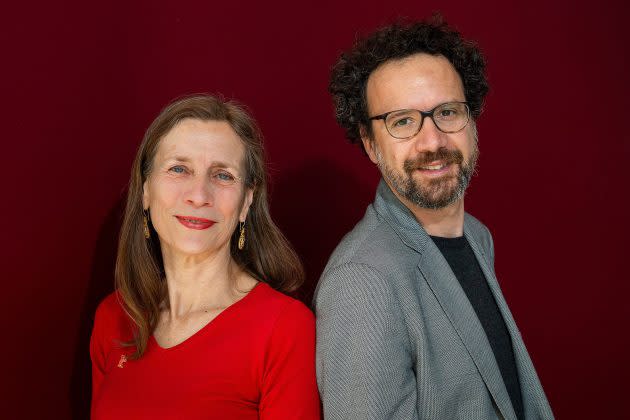Berlin Film Festival Chiefs Talk 2022 Edition: Industry Screenings Plan; Reduced Program; Rising Covid Cases In Germany
- Oops!Something went wrong.Please try again later.

It feels like yesterday that I was on the phone to Berlinale directors Mariette Rissenbeek and Carlo Chatrian following their pre-recorded video announcement of the 2021 festival program, the three of us casting an eye forward to the following year with the hope that this pandemic would finally be behind us.
Instead, while the 2022 program unveiling was broadcast live this time (still no attending press), the Covid situation in Germany remains so uncertain that once again conversations are being dominated by how, and even if, this festival is going to take place, distracting from a line-up that boasts some stellar arthouse names.
More from Deadline
Berlin Film Festival Finalizes Panorama Line-Up; Unveils Series Market & Co-Pro Series Selections
Elliot Page Boards Italian Gender Transition Doc 'Into My Name' As Executive Producer - Berlin
Those that do make it to Berlin for the event’s 72nd edition (February 10-16, with repeat screenings running until February 20) will be treated to new films from Claire Denis, making her debut in Berlin’s Competition, Hong Sang-soo, Ulrich Seidl, Rithy Panh, Peter Strickland, Bertrand Bonello, Andrew Dominik, Dario Argento and many more.
It is a thoroughly indie affair, with only one film in the line-up from a studio (Universal’s The Outfit) and one from a streamer (Netflix’s Against The Ice). That’s still an increase on last year’s tally of zero, and the Berlinale Series program has shows from both Amazon and HBO Max.
For industry wavering on whether or not the trip to Germany is worth it, Rissenbeek discloses that the festival team are now planning for a series of industry-only screenings, so that attending execs don’t have to scrum for tickets, particularly as cinemas will be strictly limited to 50% capacities.
Below, Rissenbeek and Chatrian walk us through their thoughts on this year’s edition and whether we could expect further restrictions from Germany’s regional governments in the coming weeks.
DEADLINE: Congratulations on your 2022 line-up. Were there any films you wanted that chose to wait later in the year because of the uncertainty right now?
CHATRIAN: There were a couple of films that we were tracking that were not ready in time. I believe the post-production studios have had to shut down at times [because of Covid], there were a couple of films from Europe that couldn’t make it. But I’m very happy with the selection. The films we invited accepted our invitation.
DEADLINE: It’s a line-up focused on independents rather than studios, did you try to get more studio movies?
CHATRIAN: We had discussions in September, usually we do have [more studio films]. I couldn’t go to Los Angeles, not because travel was impossible but because the studios were not prepared to welcome external people. We have one film from Universal [The Outfit, Out of Competition], there were discussions about other titles.
DEADLINE: If you had been able to travel to LA, do you think you would’ve had more studio movies in the program?
CHATRIAN: No, I don’t think it would have changed. Some of the films that were releasing in the first quarter moved later in the calendar, that had an impact.
DEADLINE: What were your discussions like with the streamers this year?
CHATRIAN: We have one film produced by Netflix [Against The Ice, Berlinale Special Gala]. We also had discussions with Amazon, at the end the selection is the result of our decisions.
DEADLINE: Is this the final line-up or is there the possibility of one or two late additions?

Jeonwonsa Film Co. Production
CHATRIAN: No, this is the final line-up. That’s also because we are premiering everything in six days, we don’t have room for more titles. That’s a pity because we had a couple that could have played very nicely, but we have to stay with the films we have.
DEADLINE: The program is 20% smaller than 2020, but that was a larger anniversary edition, to what extent is this a smaller edition?
CHATRIAN: 2020 was a special edition, we had one anniversary program that made sense for that year, and it was Forum’s 50th anniversary too. But this year we have fewer films in some sections, mainly Berlinale Special, and we also decided not to add more Galas.
DEADLINE: So for 2023, it is likely to be larger than this year, but not as big as 2020?
CHATRIAN: Yes. But for me, my concern is giving the visibility to the film’s selected. When you say ‘yes’, I feel I have a commitment towards a film. How many press will be able to see it? Will we be able to have a press conference? When will it be shown? How many other films will it collide with? But yes, I expect next year to have a little bit more than this year, but this year is totally fine. It will be a challenge for the journalists to follow this whole program.
DEADLINE: Mariette, on the organizational side, what are you expecting in terms of attendance levels? Have industry guests expressed interest in still coming to the festival?
RISSENBEEK: There will be some industry guests for sure, the sales companies and buyers will still be there. But it will be altogether much less than previous years because we won’t put on a physical market. Travel restrictions could also make traveling more complicated, especially from the U.S. and Asia. Really it’s too early to say because restrictions are still changing, it’s not clear yet.
DEADLINE: Is there a plan to put on any buyer screenings?
RISSENBEEK: We will try to offer something for the industry in order to avoid them having to fight with the normal audience for tickets, it is a work in progress.
DEADLINE: Do the current 50% capacity restrictions apply to every venue?
RISSENBEEK: Yes.
DEADLINE: How does that impact your revenues?
RISSENBEEK: In Germany there is support for events that cannot fill all their seats, you can apply for extra money from the government. We will put an application there and that will fill in the gaps for us, if we’re likely reduced to 50%.
DEADLINE: The number of Covid cases has been hitting recorded levels in Germany in recent days, do you think there’s a chance that the government could introduce further restrictions that impact the festival?
RISSENBEEK: That can always be the case nowadays. Today it is impossible to say ‘no, nothing will happen’. A lot of the infections are the Omicron mutation, so not as many people are being hospitalized as pervious variants. The situation right now is manageable, but of course if in the next 10 days they are doubling, I don’t know what the city of Berlin will do. I am talking to them on an almost daily basis nowadays.
Best of Deadline
Cancellations/Renewals Scorecard: TV Shows Ended Or Continuing In 2021-22 Season
New On Prime Video For January 2022: Daily Listings For Streaming TV, Movies & More
Winter Premiere Dates For New & Returning Series On Broadcast, Cable & Streaming
Sign up for Deadline's Newsletter. For the latest news, follow us on Facebook, Twitter, and Instagram.

